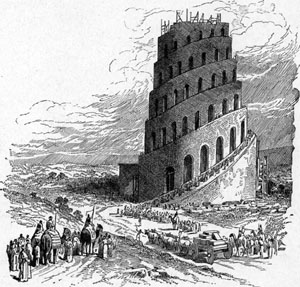 BABBLE
BABBLE
Level: Brd 2, Clr 3, Sor/Wiz 3
Components: V, M/DF
Casting Time: 1 standard action
Range: Close (25 ft. + 5 ft./2 levels)
Target: Up to 3 creatures + 1 creature per level
Duration: 1 hour/level
Saving Throw: Will negates
Spell Resistance: Yes
This spell curses those afflicted by removing their ability to speak, read, or otherwise communicate in the language they share most in common. (This will most typically be the common tongue itself.) This is not limited merely to communication with each other — rather, the language itself is stricken entirely from their minds for the duration of the spell.
The babble cannot be dispelled, but it can be removed with a break enchantment, limited wish, miracle, remove curse, or wish spell.
Material Component: A lump of clay which transforms into a small model of a ziggurat if at least one target fails their saving throw.













Would this remove a spell casters’ ability to cast spells which have a verbal component?
Yep, that was my first question. It seems like there should be saving throw per round or something, because it would completely take a caster out of the battle if it’s one hour per caster level.
Doesn’t seem likely, unless whatever ancient tongue gets used in mystic incantations is “the language [the party] share[s] most in common.”
I like this. I could see it driving the party to craft a carefully-balanced set of second fluent languages for all the players, so that half of the party speaks Elvish, half speaks Dwarvish, and (an overlapping) half speaks Gnomish. But if they lose Common, they’ll have a hard time explaining themselves to the town guards of Villageburg even though they can still communicate (laboriously) with one another.
Question: if the entire party spoke two languages e.g. Common and Elvish, are both languages affected, or does that require two Babble spells?
I like it. It’s just like the reverse of the tongues spell.
I have to wonder though – wouldn’t intelligent creatures with multiple languages simply switch to another language that’s 2nd most common amongst his or her group?
I would also put somewhere that this spell can be countered by a tongues spell.
Looking at the effect, I’d recommend simplifying it slightly, such as “the target temporarily loses all knowlege of one language, chosen by the caster. They are unable to speak, understand, read or write in that language. If she prefers, the spellcaster may choose different languages for different targets.” This effect could be quite debilitating against some targets, so I’d recommend limiting it to one target per two caster levels. I would also specify that the effect does not prevent spellcasters from preparing spells recorded in their own spellbooks.
I like this. It emphasizes the use of non-Common tongues & gets the players to think about the languages in the setting, which is always a good thing. I’d make a note about spellcasting, though, as mentioned by others.
Also, are we to assume that this is an Enchantment spell? That fact should be noted. Is it mind-affecting? Inquiring minds want to know.
For funsies, it might be cool to note that if aimed at a cleric who fails the save, instead of losing the language the cleric loses contact with their deity for that period of time.
After all, the problem with Babel was people thinking that they could put themselves on the level of God, who punished them with confusion.
(Or make another spell that does that. Or ignore it altogether. Just a thought.)
@poe: I’d say that the verbal components for a spell don’t count as a “language”.
@Skeolan: I’d say if you’ve got two “tied” languages, determine which one is lost randomly.
@Joshua: Good idea to make it reversible with tongues.
All good stuff to clarify in a full write-up.
One of the fun things in my OD&D open table is that I interpret the “although some 20% [of non-human creatures] also know the common one” phrasing in the language rules strictly: Elves, dwarves, and halflings start play with only a 20% chance of knowing the common tongue. (If their Intelligence is high enough, they can pick it as a bonus language.) This has not infrequently led to parties needing to carefully consider what language they can share in common.
On one memorable occasion two PCs watched the third member of their party brutally murdered… only to realize that the murdered PC was their interpreter. They were stranded in the middle of the jungle with no way to talk with each other. That was an interesting session. 😉